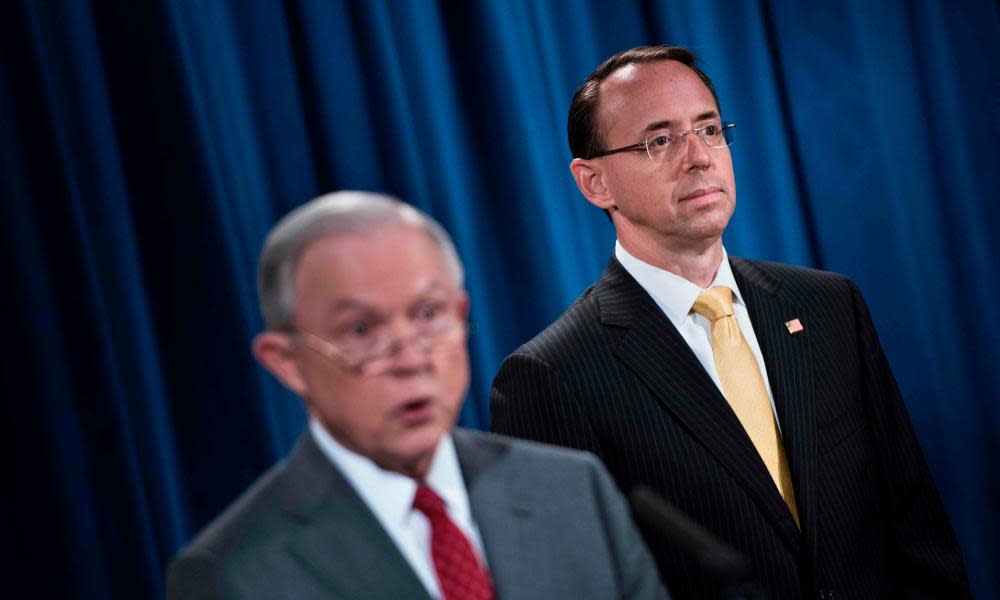Rod Rosenstein disputes report he discussed removing Trump under 25th amendment

Deputy attorney general Rod Rosenstein deemed “inaccurate” a report that he spoke with colleagues last year about the possibility of removing Donald Trump from office under the 25th amendment and about making secret recordings of the president.
The New York Times first reported the conversations on Friday, citing anonymous justice department sources and internal memos made after the alleged conversations.
Rosenstein oversees special counsel Robert Mueller’s investigation of Russian election interference and links between Trump aides and Moscow. He was motivated, the Times said, by “frustration”, “surprise” and “anger” that Trump had used a memo he wrote criticizing James Comey to justify firing the FBI director.
At least one colleague to whom Rosenstein mentioned wearing a “wire” to record Trump thought Rosenstein was speaking sarcastically, the Times reported. Potential replacements for Comey were being interviewed at the time and top justice department figures were in frequent contact with the White House.
In a statement, Rosenstein called the story “inaccurate and factually incorrect” and said the anonymous sources behind it were “advancing their own personal agenda”.
“But let me be clear about this,” Rosenstein said. “Based on my personal dealings with the president, there is no basis to invoke the 25th amendment.”
The 25th amendment, ratified in 1967 after the assassination of John F Kennedy, provides that if the vice-president and the majority of the cabinet determine the president is “unable to discharge the powers and duties of his office”, the vice-president becomes president.
An anonymous senior administration official wrote in a New York Times editorial earlier this month that there had been internal discussions about invoking the 25th amendment, prompting the vice-president, Mike Pence, to deny it.
“No, never,” he told CNN. “Why would we?”
The memos describing conversations with Rosenstein would be among the most sensitive documents held by the justice department. The Times cited anonymous sources including people briefed “on memos written by FBI officials, including Andrew G McCabe”, the former FBI deputy director.
In a statement from his lawyer Michael R Bromwich on Friday, McCabe acknowledged that he kept memos “to memorialize significant discussions he had with high-level officials”. He said he had turned the memos over to the special counsel’s office and “a set of those memos remained at the FBI”.
McCabe was fired by Trump in March, days before he was due to retire.
The motivation of whoever released the memos was equally opaque. Rosenstein is the direct supervisor of Mueller. Analysts have speculated that the removal of Rosenstein could be more damaging to the Russia investigation than removing Mueller himself.
Rosenstein must approve major new directions in the investigation and review the budget. He would receive a report written by Mueller at the conclusion of his investigation.
Trump has expressed displeasure with Rosenstein, calling him “weak” and accusing him last year of being a Democrat. Rosenstein is a Republican who was nominated by George W Bush to his former post as US attorney in Maryland.
On Friday the president’s son, Donald Trump Jr, tweeted: “Shocked!!! Absolutely Shocked!!! Ohhh, who are we kidding at this point? No one is shocked that these guys would do anything in their power to undermine [Donald Trump].”
Senate minority leader Chuck Schumer said on Friday that the story about Rosenstein must not be used for the “corrupt purpose” of firing him. Other top administration officials have been quoted as criticizing Trump without being fired, Schumer noted.

 Yahoo News
Yahoo News 
